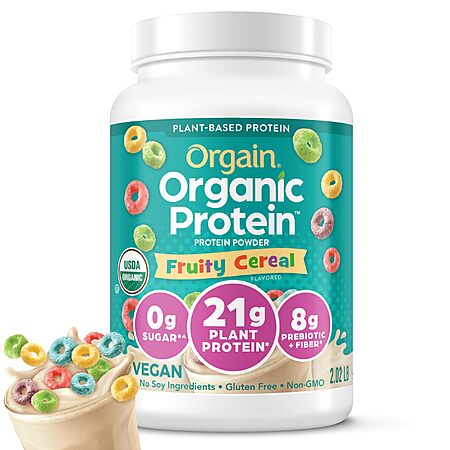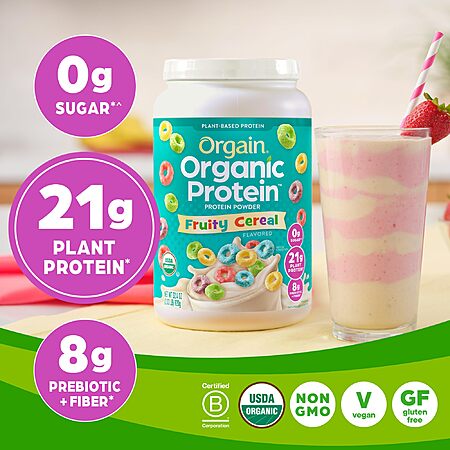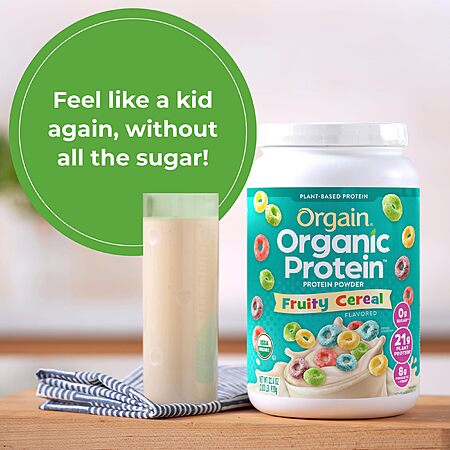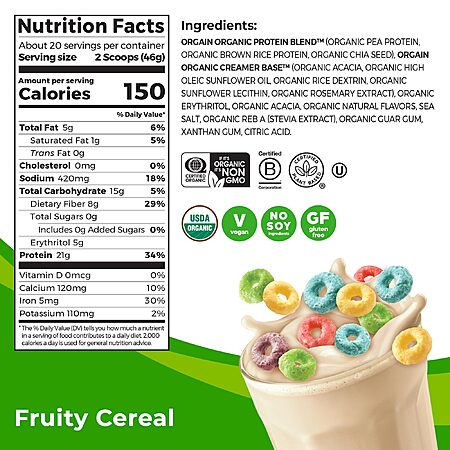Amazon has
2.03-Lb Orgain Organic Vegan Protein Powder (Fruity Cereal) on sale for $26.99 - 20% off when you 'clip' the coupon on the product page - 5% off when you checkout via Subscribe & Save =
$20.24.
Shipping is free w/ Prime or on $35+ orders.
- Note: You must be logged into your account. Coupons are typically one use per account. You may cancel your Subscribe & Save subscription any time after your order ships.
Thanks to Deal Hunter
babgaly for sharing this deal.
About this product:
- Enjoy that feel like a kid again feeling. Good, clean fruity fun, without all the sugar
- 21 grams of organic plant based protein (pea, brown rice, chia seeds), 8 grams of organic dietary fiber, 2g of net carbs, 0 grams of added sugar, 150 calories per serving and features 8g of prebiotic + fiber for gut support
- USDA organic, vegan, gluten free, no dairy ingredients, no soy ingredients, kosher, non-GMO, carrageenan free, and no artificial flavors, sweeteners, or preservatives
- Great for meal replacement, smoothie boosters, muscle recovery, and pre or post workouts





Leave a Comment
Top Comments
The chief problem with adding erythritol to platelets in vitro is that the experiment gives no chance for human physiology to step in and regulate osmolality. Adjusting 270 micromoles/liter of an impermeable solute could be done by removing 5 mg/dL of glucose from the blood, or less, if the concentration of other solutes were also adjusted.
When rats consume between 2% and 10% of their diet as erythritol, they drink more water, pee out more water, and lose more calcium, citrate, sodium, potassium, phosphate, and protein in their urine. This study stated the plasma concentrations of these were unchanged but did not show the data, and did not measure plasma osmolality. My suspicion is that this reflects complex adjustments to remove unmetabolized erythritol and balance it with water and solutes in both plasma and urine.
The pro-clotting effects shown in vitro and in mice probably reflect osmotic effects of the erythritol that would not play out in a healthy human whose physiology would allow proper control of osmolality in the blood.
On a scale of 1 to 10, this study puts me at about 0.1 in my concern that erythritol might contribute to cardiovascular disease, which is much lower than my 3.0 concern that TMAO might do so. This ranks substantially toward the bottom of the very many things that have been given some plausible suggestions as contributing to heart disease.
I find it extremely suspicious that they added erythritol to blood they took from volunteers to test the pro-clotting effects and did not report trying the same experiment on the volunteers they fed erythritol, even though they had to take blood from them anyway to show that it was very high in erythritol. I find it likely they did try that and did not get the results they wanted.
I do not use erythritol, but were I ever to consider it, I do not believe this study would influence my decision at all.
11 Comments
Sign up for a Slickdeals account to remove this ad.
It is especially problematic given that many people drink erythritol-sweetened products right before working out. The risk of heart attacks is especially high during exertion so adding erythritol makes matters worse. While the risk is less for some, it is elevated nonetheless. In my opinion, no food or supplement is worth that kind of risk, especially if you don't know if you're among that 25%.
Soon after ingesting a single drink, serum levels of erythritol increase up to 1000x. As a result, platelets clot, elevating the risk for stroke, cardiac events (aka heart attacks) and even death. Preventing platelets from clotting is why we take low dose aspirin (many people mistakenly think that it's a blood thinner). It's also why we tell patients to take an aspirin while waiting for an ambulance if they think they're having a heart attack. Erythritol does the opposite.
https://www.unmc.edu/healthsecuri...
https://time.com/6260092/erythrit...oke-study/
It is especially problematic given that many people drink erythritol-sweetened products right before working out. The risk of heart attacks is especially high during exertion so adding erythritol makes matters worse. While the risk is less for some, it is elevated nonetheless. In my opinion, no food or supplement is worth that kind of risk, especially if you don't know if you're among that 25%.
Soon after ingesting a single drink, serum levels of erythritol increase up to 1000x. As a result, platelets clot, elevating the risk for stroke, cardiac events (aka heart attacks) and even death. Preventing platelets from clotting is why we take low dose aspirin (many people mistakenly think that it's a blood thinner). It's also why we tell patients to take an aspirin while waiting for an ambulance if they think they're having a heart attack. Erythritol does the opposite.
https://www.unmc.edu/healthsecuri...
https://time.com/6260092/erythrit...oke-study/
Sign up for a Slickdeals account to remove this ad.
It is especially problematic given that many people drink erythritol-sweetened products right before working out. The risk of heart attacks is especially high during exertion so adding erythritol makes matters worse. While the risk is less for some, it is elevated nonetheless. In my opinion, no food or supplement is worth that kind of risk, especially if you don't know if you're among that 25%.
Soon after ingesting a single drink, serum levels of erythritol increase up to 1000x. As a result, platelets clot, elevating the risk for stroke, cardiac events (aka heart attacks) and even death. Preventing platelets from clotting is why we take low dose aspirin (many people mistakenly think that it's a blood thinner). It's also why we tell patients to take an aspirin while waiting for an ambulance if they think they're having a heart attack. Erythritol does the opposite.
https://www.unmc.edu/healthsecuri...iac-risks/ [unmc.edu]
https://time.com/6260092/erythrit...oke-study/ [time.com]
The chief problem with adding erythritol to platelets in vitro is that the experiment gives no chance for human physiology to step in and regulate osmolality. Adjusting 270 micromoles/liter of an impermeable solute could be done by removing 5 mg/dL of glucose from the blood, or less, if the concentration of other solutes were also adjusted.
When rats consume between 2% and 10% of their diet as erythritol, they drink more water, pee out more water, and lose more calcium, citrate, sodium, potassium, phosphate, and protein in their urine. This study stated the plasma concentrations of these were unchanged but did not show the data, and did not measure plasma osmolality. My suspicion is that this reflects complex adjustments to remove unmetabolized erythritol and balance it with water and solutes in both plasma and urine.
The pro-clotting effects shown in vitro and in mice probably reflect osmotic effects of the erythritol that would not play out in a healthy human whose physiology would allow proper control of osmolality in the blood.
On a scale of 1 to 10, this study puts me at about 0.1 in my concern that erythritol might contribute to cardiovascular disease, which is much lower than my 3.0 concern that TMAO might do so. This ranks substantially toward the bottom of the very many things that have been given some plausible suggestions as contributing to heart disease.
I find it extremely suspicious that they added erythritol to blood they took from volunteers to test the pro-clotting effects and did not report trying the same experiment on the volunteers they fed erythritol, even though they had to take blood from them anyway to show that it was very high in erythritol. I find it likely they did try that and did not get the results they wanted.
I do not use erythritol, but were I ever to consider it, I do not believe this study would influence my decision at all.
The chief problem with adding erythritol to platelets in vitro is that the experiment gives no chance for human physiology to step in and regulate osmolality. Adjusting 270 micromoles/liter of an impermeable solute could be done by removing 5 mg/dL of glucose from the blood, or less, if the concentration of other solutes were also adjusted.
When rats consume between 2% and 10% of their diet as erythritol, they drink more water, pee out more water, and lose more calcium, citrate, sodium, potassium, phosphate, and protein in their urine. This study stated the plasma concentrations of these were unchanged but did not show the data, and did not measure plasma osmolality. My suspicion is that this reflects complex adjustments to remove unmetabolized erythritol and balance it with water and solutes in both plasma and urine.
The pro-clotting effects shown in vitro and in mice probably reflect osmotic effects of the erythritol that would not play out in a healthy human whose physiology would allow proper control of osmolality in the blood.
On a scale of 1 to 10, this study puts me at about 0.1 in my concern that erythritol might contribute to cardiovascular disease, which is much lower than my 3.0 concern that TMAO might do so. This ranks substantially toward the bottom of the very many things that have been given some plausible suggestions as contributing to heart disease.
I find it extremely suspicious that they added erythritol to blood they took from volunteers to test the pro-clotting effects and did not report trying the same experiment on the volunteers they fed erythritol, even though they had to take blood from them anyway to show that it was very high in erythritol. I find it likely they did try that and did not get the results they wanted.
I do not use erythritol, but were I ever to consider it, I do not believe this study would influence my decision at all.
Leave a Comment